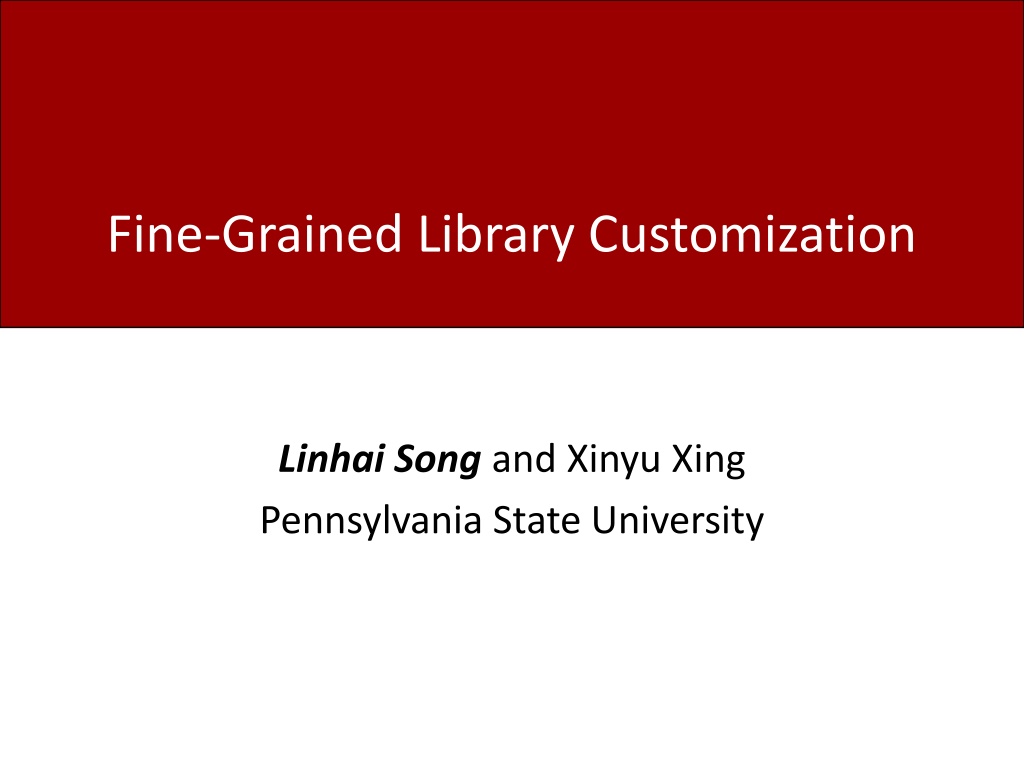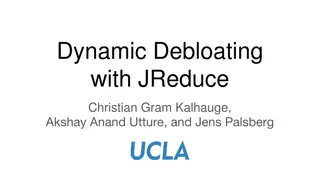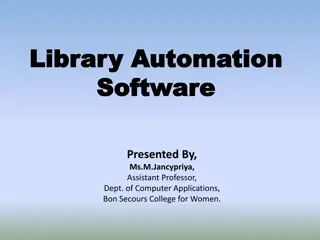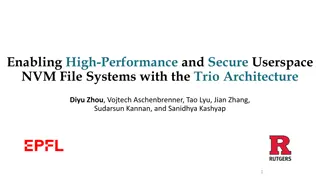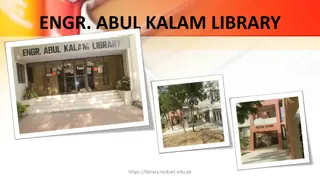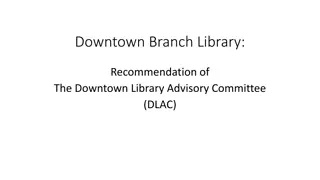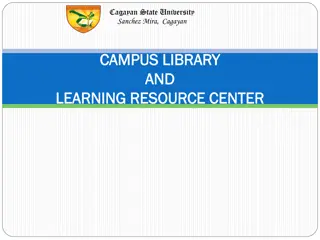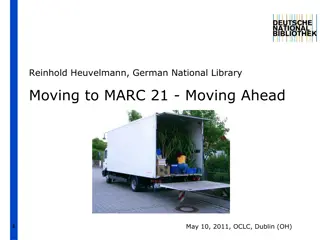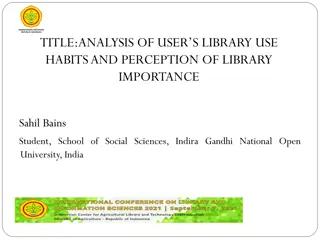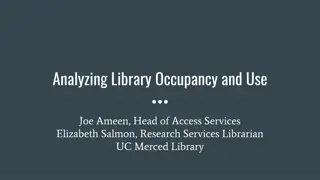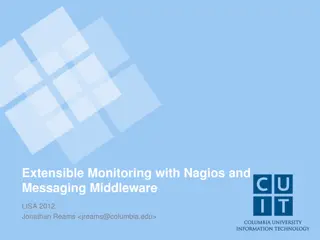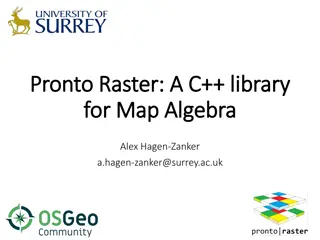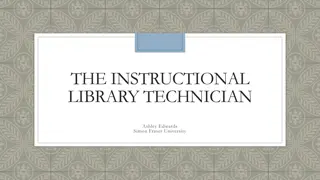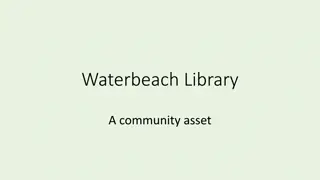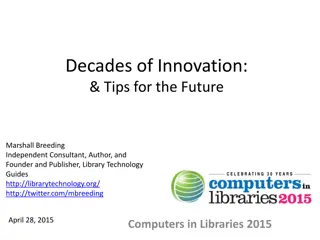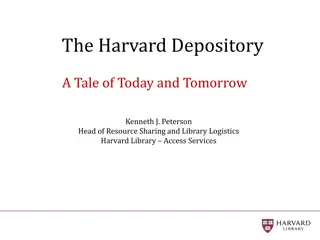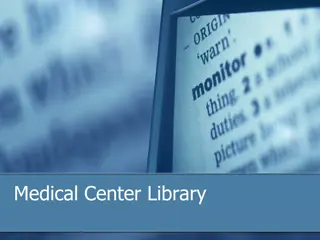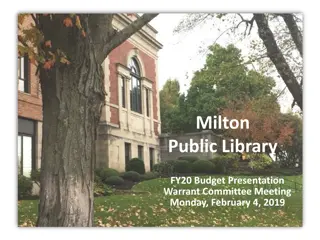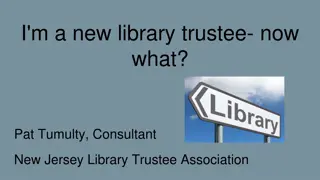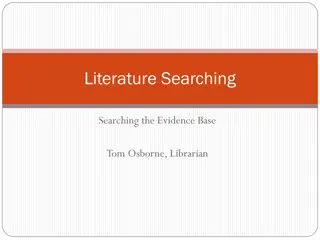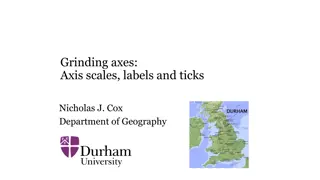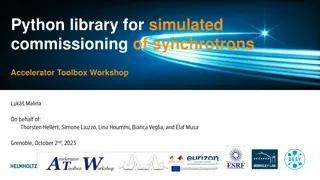Effective Debloating Techniques for Library Customization
"Explore the challenges of code bloat in libraries due to modular design, and learn about existing debloating techniques that utilize function granularity. Discover a novel approach focusing on exploring opportunities within invoked functions to streamline code execution and reduce side effects."
Download Presentation

Please find below an Image/Link to download the presentation.
The content on the website is provided AS IS for your information and personal use only. It may not be sold, licensed, or shared on other websites without obtaining consent from the author. Download presentation by click this link. If you encounter any issues during the download, it is possible that the publisher has removed the file from their server.
E N D
Presentation Transcript
Fine-Grained Library Customization Linhai Song and Xinyu Xing Pennsylvania State University
Motivation Modular design leads to code bloat Library provides comprehensive functionalities Library user has limited usage scenarios Bloated code widely exists Bloated code causes a lot of problems Contain potential vulnerabilities
Motivation Modular design leads to code bloat Library provides comprehensive functionalities Library user has limited usage scenarios Bloated code widely exists Bloated code causes a lot of problems Contain potential vulnerabilities Increase memory pressure
Motivation Modular design leads to code bloat Library provides comprehensive functionalities Library user has limited usage scenarios Bloated code widely exists Bloated code causes a lot of problems Contain potential vulnerabilities Increase memory pressure Incur computation inefficiency
Motivation Modular design leads to code bloat Library provides comprehensive functionalities Library user has limited usage scenarios Bloated code widely exists Bloated code causes a lot of problems Contain potential vulnerabilities Increase memory pressure Incur computation inefficiency Consume network bandwidth during distribution
Existing Debloating Techniques Utilize function as customization granularity May miss some debloating opportunities //Library void func_A() { func_C(); } void func_B(struct packet * p) { p.type = ; if(p.type == a) { } else if (p.type == b) { } else if (p.type == c ) { func_D(); } } void func_C() { } void func_D() { } //Application int main() { struct packet * p; while(func_B(p)) { if(p.type == a) { } else if(p.type ==b) { } } }
Our Approach Explore opportunities inside invoked functions Code not executed under the calling context Code not producing any side effect //Library void func_A() { func_C(); } void func_B(struct packet * p) { p.type = ; if(p.type == a) { } else if (p.type == b) { } else if (p.type == c ) { func_D(); } } void func_C() { } void func_D() { } //Application int main() { struct packet * p; while(func_B(p)) { if(p.type == a) { } else if(p.type ==b) { } } }
Problem Scope Our focus: network protocol implementation Protocol implementation is widely used Most attacks are conducted through network Our technique is not limited to network protocol Collected Benchmarks Network Middleware Programs Internet of Things Applications
Modeling Protocol Implementation System Call: receive raw packet data Decoder: change raw data to packet structures Handler: achieve desired functionalities typedef struct { int iType; int iMsgSize; } MIDI_MSG; void * buf; System Call Decoder Handler switch(msg.iType) { case type1: msg.iMsgSize = 2; case type2: case type3: case type4: } switch(msg.iType) { case type1: handle_type1( ); case type2: handle_type2( ); case type3: handle_type3( ); default: } recv(sockfd, buf, )
Key Observations 1. Mismatch between decoder and handler 2. Configurable handler cuttable decoder 3. Knowledge of incoming packets type1 System Call Decoder Handler switch(msg.iType) { case type1: msg.iMsgSize = 2; case type2: case type3: case type4: } switch(msg.iType) { case type1: handle_type1( ); case type2: handle_type2( ); case type3: handle_type3( ); default: } recv(sockfd, buf, )
Outline Introduction Observation 1: details and an example Observation 2: details and an example Observation 3: details and an example Future works and conclusions
Outline Introduction Observation 1: details and an example Observation 2: details and an example Observation 3: details and an example Future works and conclusions Future works and conclusions Introduction Observation 1: details and an example Observation 2: details and an example Observation 3: details and an example
MIDIlib Overview MIDI: a protocol for electronic music MIDIlib: a C library to handle MIDI protocol I/O libraries for MIDI files Implemented in midifile.c 5 executable applications m2rtttl and 4 others System Call Decoder Handler midifile.c m2rtttl.c fread( )
Packet Field Analysis System Call Decoder Handler return a midi packet the decoder function //Decoder BOOL midiReadNextMsg( , MIDI_MSG * msg)) { switch(msg.iType) { case msgNoteOff: msg->Data.NoteOff.iCh = ; msg->Data.NoteOff.iNote = ; break; case msgNoteOn: break; case msgMetaEvent: break; case msgNoteKeyPress: break; case msgSetParameter: break; } } //Handler while(midiReadNextMsg(mf, &msg)) { switch(msg.iType) { case msgNoteOff: if(iChannel == msg.Data.NoteOff.iCh) { outStdout( ); iCurrPlayingNote = -1; } case msgNoteOn: break; case msgMetaEvent: break; default: break; } } 44 fields defined use packet fields define packet fields 9 fields used
Packet Type Analysis System Call Decoder Handler assemble an msgNoteOff packet //Decoder BOOL midiReadNextMsg( , MIDI_MSG * msg)) { switch(msg.iType) { case msgNoteOff: msg->Data.NoteOff.iCh = ; msg->Data.NoteOff.iNote = ; break; case msgNoteOn: break; case msgMetaEvent: break; case msgNoteKeyPress: break; case msgSetParameter: break; } } //Handler while(midiReadNextMsg(mf, &msg)) { switch(msg.iType) { case msgNoteOff: if(iChannel == msg.Data.NoteOff.iCh) { outStdout( ); iCurrPlayingNote = -1; } case msgNoteOn: break; case msgMetaEvent: break; default: break; } } 9 types assembled process an msgNoteOff packet 3 types used ignore other types
Eliminate Dead Field Assignments Compute struct field offset Identify dead fields and their assignments Simple data dependence analysis Trim all identified instructions typedef struct { int a; int b; } packet; //decoder packet p; p.a = ; d = p.b = d; //handler if (p.a == ) { } offset: 0 (r, w) (0, read) offset: 4 (w) (0, write) (4, write)
Eliminate Unused Packet Types Extract execution constraints from handler Detect conflicting constraints inside decoder Trim corresponding instructions Field: a Condition: type == 2 X Condition: type == 1 typedef struct { int type; int a; int b; } packet; //decoder packet p; if(p.type==1) { } else if(p.type==2) { p.a = xxx; } //handler if (p.type==1) { printf( %d\n , p.a); printf( %d\n , p.b); }
Experimental Results Implantation based on LLVM-5.0.0 Evaluation metrics: How many packet field assignments are cut (PF)? How many lines of source code are cut (LOC)? How many lines of LLVM IR are cut (LOLL)? more effective PF LOC LOLL Dead Field Assignment 6 6 51 Unused Packet Type Total 33 36 62 65 355 367
Experimental Results Implantation based on LLVM-5.0.0 Evaluation metrics: How many packet field assignments are cut (PF)? How many lines of source code are cut (LOC)? How many lines of LLVM IR are cut (LOLL)? PF LOC LOLL Dead Field Assignment 6 6 51 Unused Packet Type Total 33 36 37.80% 62 65 355 367 48.36%
Experimental Results Implantation based on LLVM-5.0.0 Evaluation metrics: How many packet field assignments are cut (PF)? How many lines of source code are cut (LOC)? How many lines of LLVM IR are cut (LOLL)? PF LOC LOLL Dead Field Assignment 6 6 51 Unused Packet Type Total 33 36 62 65 355 367
Experimental Results Implantation based on LLVM-5.0.0 Evaluation metrics: How many packet field assignments are cut (PF)? How many lines of source code are cut (LOC)? How many lines of LLVM IR are cut (LOLL)? PF LOC LOLL Dead Field Assignment 6 6 51 Unused Packet Type Total 33 36 62 65 355 367 39.63% 50%
Summary A simple code analysis on midilib 9 types of packets assembled by the decoder 3 types of packets processed Mismatch between a decoder and a handler 40% decoder code can be eliminated System Call Decoder Handler switch(msg.iType) { case type1: msg.iMsgSize = 2; case type2: case type3: case type4: } switch(msg.iType) { case type1: handle_type1( ); case type2: handle_type2( ); case type3: handle_type3( ); default: } recv(sockfd, buf, )
Outline Introduction Observation 1: details and an example Observation 2: details and an example Observation 3: details and an example Future works and conclusions Future works and conclusions Introduction Observation 1: details and an example Observation 2: details and an example Observation 3: details and an example
Snort Overview An open-source intrusion detection system Take configuration rules as input Action: accept/drop/alert Condition: <protocol, sip, dip, sport, dport> Multiple-layer decoders are used action destination ip source ip drop tcp 10.0.0.0/24 80 10.1.0.0/24 50 destination port source port protocol
Layer-2 Decoder System Call Decoder Handler if ( ) { layer2_decoder = DecodeEthPkt; } else if ( ) { layer2_decoder = DecodeSlipPkt; } else { layer2_decoder = DecodeRawPkt; } layer-2 decoders Layer 4 void DecodeEthPkt(u_char *pkt, ) { pkt_type = ntohs(pkt->ether_type) switch(pkt_type) { case TYPE_IP: DecodeIP( ); return; case TYPE_ARP: DecodeARP( ); return; case TYPE_IPX: DecodeIPX( ); return; } } Layer 3 pcap_loop(..., layer2_decoder, ) layer-3 decoders Layer 2 the system call to receive packets
Layer-3 Decoder System Call Decoder Handler void DecodeIP(u_char *pkt, ) { iph = (IPHdr *)pkt; net.sip = iph->ip_src; net.dip = iph->ip_dst; switch(iph->ip_proto) { case TCP: net.proto = TCP; DecodeTCP( ); return; case UDP: net.proto = UDP; DecodeUDP( ); return; case ICMP: net.proto = ICMP; DecodeICMP( ); return; } } Layer 4 typedef struct _NetData { unsigned long sip; unsigned long dip; unsigned short sport; unsigned short dport; unsigned int proto; } NetData; extract packet information Layer 3 layer-4 decoders NetData net; Layer 2
Layer-4 Decoder System Call Decoder Handler void DecodeTCP(u_char *pkt, ) { tcph = (TCPHdr *)pkt; net.sport = ntohs(tcph->sport); net.dport = ntohs(tcph->dport); } Layer 4 typedef struct _NetData { unsigned long sip; unsigned long dip; unsigned short sport; unsigned short dport; unsigned int proto; } NetData; Layer 3 extract port information NetData net; Layer 2 used during rule matching
Decoder System Call Decoder Handler Protocol Extract Information Layer-4 TCP, UDP, ICMP sport, dport Layer-3 IP, IPX, ARP Layer-2 Ethernet, SLIP protocol, sip, dip
Decoder System Call Decoder Handler Protocol Extract Information Layer-4 TCP, UDP, ICMP sport, dport Layer-3 IP, IPX, ARP Layer-2 Ethernet, SLIP protocol, sip, dip
Decoder System Call Decoder Handler Protocol Extract Information Layer-4 TCP, UDP, ICMP sport, dport Layer-3 IP, IPX, ARP Layer-2 Ethernet, SLIP protocol, sip, dip
Decoder System Call Decoder Handler Protocol Extract Information Layer-4 TCP, UDP, ICMP sport, dport Layer-3 IP, IPX, ARP Layer-2 Ethernet, SLIP protocol, sip, dip
Decoder System Call Decoder Handler Protocol Extract Information Layer-4 TCP, UDP, ICMP sport, dport Layer-3 IP, IPX, ARP Layer-2 Ethernet, SLIP protocol, sip, dip
Rule Matching System Call Decoder Handler void ApplyRules() { while( ) { r = //fetch a rule if(MatchRule(r)) { //take some actions return; } } }
Rule Matching System Call Decoder Handler compare protocols int MatchRule(r) { if(r->proto != net.proto ) goto bottom; if(r->sip != net.sip) goto bottom; if(r->dip != net.dip) goto bottom; if(r->sport != ANY && r->sport != net.sport) goto bottom; if(r->dport != ANY && r->dport != net.dport) goto bottom; return 1; bottom: return 0; void ApplyRules() { while( ) { r = //fetch a rule if(MatchRule(r)) { //take some actions return; } } } }
Rule Matching System Call Decoder Handler compare ips int MatchRule(r) { if(r->proto != net.proto ) goto bottom; if(r->sip != net.sip) goto bottom; if(r->dip != net.dip) goto bottom; if(r->sport != ANY && r->sport != net.sport) goto bottom; if(r->dport != ANY && r->dport != net.dport) goto bottom; return 1; bottom: return 0; void ApplyRules() { while( ) { r = //fetch a rule if(MatchRule(r)) { //take some actions return; } } } }
Rule Matching System Call Decoder Handler int MatchRule(r) { if(r->proto != net.proto ) goto bottom; if(r->sip != net.sip) goto bottom; if(r->dip != net.dip) goto bottom; if(r->sport != ANY && r->sport != net.sport) goto bottom; if(r->dport != ANY && r->dport != net.dport) goto bottom; return 1; bottom: return 0; compare ports void ApplyRules() { while( ) { r = //fetch a rule if(MatchRule(r)) { //take some actions return; } } } }
Debloating Opportunity Wildcard any configured for port numbers match any port number widely used to block traffic between two subnets layer-4 decoders can possibly be trimmed int MatchRule(r) { if(r->proto != net.proto ) goto bottom; if(r->sip != net.sip) goto bottom; if(r->dip != net.dip) goto bottom; if(r->sport != ANY && r->sport != net.sport) goto bottom; if(r->dport != ANY && r->dport != net.dport) goto bottom; return 1; bottom: return 0; How any is handled during rule matching }
How to Debloat? Propagate constant values from configuration Fold statically computable expressions Eliminate dead code int MatchRule(r) { if(r->proto != net.proto ) goto bottom; if(r->sip != net.sip) goto bottom; if(r->dip != net.dip) goto bottom; if(r->sport != ANY && r->sport != net.sport) goto bottom; if(r->dport != ANY && r->dport != net.dport) goto bottom; return 1; bottom: return 0; False void DecodeTCP(u_char *pkt, ) { tcph = (TCPHdr *)pkt; net.sport = ntohs(tcph->sport); net.dport = ntohs(tcph->dport); } ANY ANY }
Experimental Results Evaluation metrics: How many lines of source code are cut (LOC)? 313 LOC (46.99% decoder code) can be eliminated Performance improvement after debloating 15%
Summary A simple empirical study on snort any is configured for port numbers Layer-4 decoders can be trimmed Configurable handler cuttable decoder 46.99% decoder code can be eliminated System Call Decoder Handler switch(msg.iType) { case type1: msg.iMsgSize = 2; case type2: case type3: case type4: } switch(msg.iType) { case type1: handle_type1( ); case type2: handle_type2( ); case type3: handle_type3( ); default: } recv(sockfd, buf, )
Outline Introduction Observation 1: details and an example Observation 2: details and an example Observation 3: details and an example Future works and conclusions Future works and conclusions Introduction Observation 1: details and an example Observation 2: details and an example Observation 3: details and an example
Open62541 Overview Open-source implementation of OPC UA OPC UA: OPC Unified Architecture Support 6 packet types Provide code for both client and server Client Server enum messageType { UA_HEL = 0x48454C, // H E L UA_ACK = 0x41434B, // A C k UA_ERR = 0x455151, // E R R UA_OPN = 0x4F504E, // O P N UA_MSG = 0x4D5347, // M S G UA_CLO = 0x434C4F // C L O };
Empirical Study Whether there are unused handlers? Packet Type C -> S S -> C S Handler C Handler UA_HEL Y N Y N UA_ACK N Y N N UA_ERR N Y Y Y UA_OPN Y Y Y Y UA_MSG Y Y Y Y UA_CLO Y Y Y Y C -> S: Client -> Server S -> C: Server -> Client S Handler: Server Side Handler C Hander: Client Side Hander
Empirical Study Whether there are unused handlers? Packet Type C -> S S -> C S Handler C Handler UA_HEL Y N Y N UA_ACK N Y N N UA_ERR N Y Y Y UA_OPN Y Y Y Y UA_MSG Y Y Y Y UA_CLO Y Y Y Y C -> S: Client -> Server S -> C: Server -> Client S Handler: Server Side Handler C Hander: Client Side Hander
Empirical Study Whether there are unused handlers? Packet Type C -> S S -> C S Handler C Handler UA_HEL Y N Y N UA_ACK N Y N N UA_ERR N Y Y Y UA_OPN Y Y Y Y UA_MSG Y Y Y Y UA_CLO Y Y Y Y C -> S: Client -> Server S -> C: Server -> Client S Handler: Server Side Handler C Hander: Client Side Hander
Empirical Study Whether there are unused handlers? Packet Type C -> S S -> C S Handler C Handler UA_HEL Y N Y N UA_ACK N Y N N UA_ERR N Y Y Y UA_OPN Y Y Y Y UA_MSG Y Y Y Y UA_CLO Y Y Y Y C -> S: Client -> Server S -> C: Server -> Client S Handler: Server Side Handler C Hander: Client Side Hander
Empirical Study Whether there are unused handlers? Packet Type C -> S S -> C S Handler C Handler UA_HEL Y N Y N UA_ACK N Y N N UA_ERR N Y Y Y UA_OPN Y Y Y Y UA_MSG Y Y Y Y UA_CLO Y Y Y Y C -> S: Client -> Server S -> C: Server -> Client S Handler: Server Side Handler C Hander: Client Side Hander
Empirical Study Whether there are unused handlers? Packet Type C -> S S -> C S Handler C Handler UA_HEL Y N Y N UA_ACK N Y N N UA_ERR N Y Y Y UA_OPN Y Y Y Y UA_MSG Y Y Y Y mismatch UA_CLO Y Y Y Y C -> S: Client -> Server S -> C: Server -> Client S Handler: Server Side Handler C Hander: Client Side Hander
Outline Introduction Observation 1: details and an example Observation 2: details and an example Observation 3: details and an example Future works and conclusions Future works and conclusions Introduction Observation 1: details and an example Observation 2: details and an example Observation 3: details and an example
Future Works Study more protocol implementations Look for more debloating opportunities Verify whether identified patterns widely exist Build automated static techniques Identify cases following our patterns Apply corresponding debloating Study Building tools
